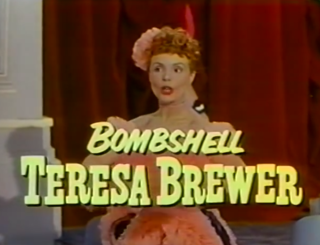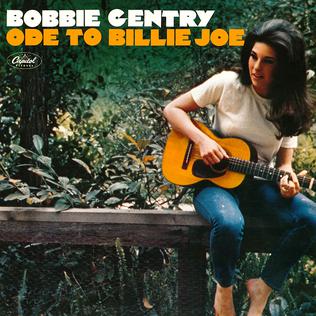Related Research Articles

Bobbie Lee Gentry is a retired American singer-songwriter who was one of the first female artists to compose and produce her own material.

"Billie Jean" is a song by American singer Michael Jackson, released by Epic Records on January 2, 1983, as the second single from Jackson's sixth studio album, Thriller (1982). It was written and composed by Jackson and produced by Jackson and Quincy Jones. "Billie Jean" blends post-disco, rhythm and blues, funk and dance-pop. The lyrics describe a woman, Billie Jean, who claims that the narrator is the father of her newborn son, which he denies. Jackson said the lyrics were based on groupies' claims about his older brothers when he toured with them as the Jackson 5.

Teresa Brewer was an American singer whose style incorporated pop, country, jazz, R&B, musicals, and novelty songs. She was one of the most prolific and popular female singers of the 1950s, recording nearly 600 songs.

"Ode to Billie Joe" is a song written and recorded by Bobbie Gentry, a singer-songwriter from Chickasaw County, Mississippi. The single, released on July 10, 1967, was a number-one hit in the US within three weeks of release and a big international seller. Billboard ranked the record as the No. 3 song of the year. The recording remained on the Billboard chart for 20 weeks and was the Number 1 song for four weeks.
"Blue Moon" is a classic popular song written by Richard Rodgers and Lorenz Hart in 1934. It may be the first instance of the familiar "50s progression" in a popular song and has become a standard ballad. The song was a hit twice in 1949 with successful recordings in the U.S. by Billy Eckstine and Mel Tormé. In 1961, "Blue Moon" became an international number-one hit for the doo-wop group The Marcels, on the Billboard 100 chart and in the UK Singles chart. Over the years, "Blue Moon" has been covered by various artists, including versions by Frank Sinatra, Billie Holiday, Elvis Presley, Sam Cooke, The Platters, The Mavericks, Dean Martin, Yvonne De Carlo, for Masterseal Records 1957, The Supremes, Cyndi Lauper, Bob Dylan and Rod Stewart. Bing Crosby included the song in a medley on his album On the Happy Side (1962). Cowboy Junkies recorded the song on their album The Trinity Sessions. It is also the anthem of English Football League club Crewe Alexandra and English Premier League football club Manchester City, who have both adapted the song slightly.

"Waiting for a Star to Fall" is a song released by the pop duo Boy Meets Girl in 1988. It was a worldwide hit and became their signature song. Since its release, it has been remixed and covered by many artists, including Cabin Crew and Sunset Strippers.

"Sweet Emotion" is a song by the American rock band Aerosmith, released by Columbia Records in April 1975 on the album Toys in the Attic and was released as a single a month later on May 19. The song began a string of pop hits and large-scale mainstream success for the band that would continue for the remainder of the 1970s. The song was written by lead singer Steven Tyler and bassist Tom Hamilton, produced by Jack Douglas and recorded at the Record Plant.

"Borderline" is a song recorded by American singer Madonna for her eponymous debut album Madonna (1983). It was released on February 15, 1984 by Sire Records as the album's fifth single. Written and composed by its producer Reggie Lucas, the song was remixed by Madonna's then-boyfriend John "Jellybean" Benitez. The singer used refined and expressive vocals to deliver lyrics about an unfulfilled love.
"Gonna Get Along Without Ya Now" is a popular song written by Milton Kellem, and published in 1951. Originally written in English, it has been done in several styles and tempos.

"Why Do Fools Fall in Love" is a song by New York City-based rock and roll group Frankie Lymon & the Teenagers that was released on January 10, 1956. It reached No. 1 on the R&B chart, No. 6 on Billboard's Pop Singles chart, and No. 1 on the UK Singles Chart in July.

"Misty Blue" is a song written by Bob Montgomery that has been recorded and made commercially successful by several music artists. Although Montgomery wrote the song for a different artist in mind, it was brought first to the attention of Wilma Burgess in 1966. It was recorded by Eddy Arnold the following year, both versions were top 5 Country Hits. A decade later, blues artist Dorothy Moore released the highest-charting version of the song and it reached the top ten in several different radio formats. Following Moore's revival of the track, numerous artists re-covered the tune, including country artist Billie Jo Spears. Spears's version would also go on to become a successful single release. Numerous other artists and musicians of different genres have recorded their own versions of "Misty Blue". The song is now considered both a country music and blues standard.

"In the Still of the Nite", also subsequently titled "In the Still of the Night", is a song written by Fred Parris and recorded by his Five Satins. While only a moderate hit when first released, it has received considerable airplay over the years and is notable as one of the best known doo-wop songs, recorded by artists such as Boyz II Men and Debbie Gibson. It is heard in several films, such as The Buddy Holly Story and Dirty Dancing, and in Martin Scorsese's The Irishman.

"You Send Me" is a song written and originally recorded by American singer Sam Cooke, released as a single in 1957 by Keen Records. Produced by Bumps Blackwell and arranged and conducted by René Hall. The song, Cooke's debut single, was a massive commercial success, becoming a No. 1 hit on both Billboard's Rhythm & Blues Records chart and the Billboard Hot 100.

"Da Doo Ron Ron" is a song written by Jeff Barry, Ellie Greenwich and Phil Spector. It first became a popular top five hit single for the American girl group The Crystals in 1963. American teen idol Shaun Cassidy covered the song in 1977 and his version hit number one on the Billboard Hot 100 chart. There have also been many other cover versions of this song, including one by the songwriters Jeff Barry and Ellie Greenwich themselves, performing as The Raindrops.
"Rock and Roll, Hoochie Koo" is a rock song written by Rick Derringer. It was first recorded in 1970 by Johnny Winter and his band, Johnny Winter And, of which Derringer was a member. In 1973, Derringer recorded a solo version and it became his only Top 40 chart hit as a solo artist, peaking on the Billboard Hot 100 at number 23. Both Winter and Derringer have recorded multiple live versions of the song, and several other artists have recorded covers.

Joseph "Sonny" West is an American songwriter and musician, best known as the co-writer of two of Buddy Holly's biggest hits: "Oh, Boy!" and "Rave On".

"Beat It" is a song by American singer Michael Jackson from his sixth studio album, Thriller (1982). It was produced by Jackson and Quincy Jones. Quincy Jones encouraged Jackson to include a rock song on the album, though Jackson had never previously shown an interest in the genre. Jackson later said of "Beat It", "I wanted to write a song, the type of song that I would buy if I were to buy a rock song... That is how I approached it and I wanted the children to really enjoy it—the school children as well as the college students."

"An Old Fashioned Love Song" is a 1971 song written by Paul Williams and performed by the American pop-rock band Three Dog Night. Chuck Negron performed the lead vocal on this track. Taken as the lead single from their 1971 album, Harmony, the song peaked at number four on the Billboard Hot 100 chart in December 1971, becoming the band's seventh top-ten hit. It was Three Dog Night's first record to top the U.S. easy listening chart. It reached number two in Canada. Its lyrics suggest the straightforward and melodic nature of the tune: Just an old fashioned love song / Comin' down in three part harmony / Just an old fashioned love song / One I'm sure they wrote for you and me.
"New Orleans" is a song written by Frank Guida and Joseph Royster and performed by Gary U.S. Bonds. It reached #5 on the U.S. R&B chart, #6 on the U.S. pop chart, and #16 on the UK Singles Chart in 1960. It was featured on his 1961 album Dance 'Til Quarter to Three with U.S. Bonds.
References
- ↑ "Teresa Brewer, "A Sweet Old Fashioned Girl" Single Release" . Retrieved March 17, 2018.
- ↑ "Teresa Brewer, "A Sweet Old Fashioned Girl" Chart Positions" . Retrieved March 17, 2018.
- ↑ "1956's Top Popular Records" Billboard January 26, 1957: 60
- ↑ "Billie Anthony, "Sweet Old Fashioned Girl" Single Release" . Retrieved March 17, 2018.
- ↑ "Terry-Thomas with His Rock 'N' Roll Rotters, "A Sweet Old-Fashioned Boy" Single Release" . Retrieved March 17, 2018.
| This 1950s single-related article is a stub. You can help Wikipedia by expanding it. |